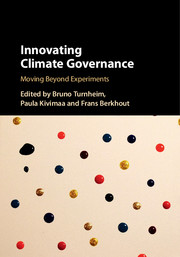Book contents
- Innovating Climate Governance
- Innovating Climate Governance
- Copyright page
- Contents
- Contributors
- Preface
- 1 Beyond Experiments
- 2 Global Climate Governance after Paris
- Part I Experiments
- 3 Anchoring and Mobility of Local Energy Concepts
- 4 Realigning Circulations
- 5 Understanding Public Dialogue as an Embedded Democratic Innovation in UK Climate Governance
- 6 Broadening Experimentation through Research-Industry Collaboratives in the Australian Water Sector
- Part II Beyond Experiments
- Index
- References
5 - Understanding Public Dialogue as an Embedded Democratic Innovation in UK Climate Governance
from Part I - Experiments
Published online by Cambridge University Press: 29 March 2018
- Innovating Climate Governance
- Innovating Climate Governance
- Copyright page
- Contents
- Contributors
- Preface
- 1 Beyond Experiments
- 2 Global Climate Governance after Paris
- Part I Experiments
- 3 Anchoring and Mobility of Local Energy Concepts
- 4 Realigning Circulations
- 5 Understanding Public Dialogue as an Embedded Democratic Innovation in UK Climate Governance
- 6 Broadening Experimentation through Research-Industry Collaboratives in the Australian Water Sector
- Part II Beyond Experiments
- Index
- References
Summary
- Type
- Chapter
- Information
- Innovating Climate GovernanceMoving Beyond Experiments, pp. 85 - 102Publisher: Cambridge University PressPrint publication year: 2018



